What follows is our official exit interview with Merritt Bankes, who just recently left Ypsilanti, headed for Tecumseh.
MARK: Can you please state your full name for the record?
MERRITT: Merritt Bankes.
MARK: OK, let’s start at the beginning… What kind of kid were you?
MERRITT: Feral! A free-range chicken! [Laughs.] I didn’t even wear clothes regularly until kindergarten. I’m so eternally grateful that my parents just kind of let me be. I was pretty quiet as a kid, but I loved to laugh and get really dirty outside. I loved to read, write, draw, and play with animals. I was really free, but not outgoing or loud. I think a lot of my days were spent telling family members stories that I’d made up, and then going out to look for fossils in the driveway.
MARK: And how old are you right now?
MERRITT: 28.
MARK: What was it that initially brought you to Ypsilanti?
MERRITT: I left art school in Chicago because I wanted to save the wetlands. Art school really opened my eyes to things I didn’t know about, things I was socialized to ignore, think were weird, etc.
MARK: Where were you going to art school?
MERRITT: Columbia College Chicago.
MARK: So you had a kind of environmental awakening in your early 20s, while attending art school?
MERRITT: Yes, I guess you could say that vegetarianism opened my eyes to modern environmental activism and sustainability. I became a vegetarian (something I no longer practice) while in college, and started thinking about going back to nature. In the winter and spring of 2012, it was really all that I was thinking about.
MARK: What was it that woke you up to environmental activism? For me, it was John Robbins’ Diet for a New America. I can’t remember the exact chain for events, but, around the time that I read it, without a great deal of forethought, I gave up all animal products and became a vegan. I think I did that for close to five years, and then continued on as a vegetarian for about five more. I still care about the cause, but my priorities kind of shifted over time.
MERRITT: I think vegetarianism is like the gateway diet. [Laughs.] For me, it wasn’t just about digging into animal cruelty, but truly understanding where food comes from. Like, have you ever looked at some onions in a store and thought, “Wow, there’s so many, and they never seem to run out”? I see that pile of onions, and I think of how much land was used just to make that selection of onions, in just this store, in just this one little town… and some of them are already rotting. Why do we make so much food that we don’t even need, in such land-ravaging ways? I definitely have an activist streak in me, and I knew the earth wanted me to know more. I had that priority shift you mentioned as well. I became more interested in eating locally, and eating meals that my ancestors ate decades ago… like really hearty food made from scratch… If I can ask you a question, I’d like to know how your priorities shifted.
MARK: It’s difficult to articulate. I guess you could say, the older I got, the more I started focusing on local impact, and across a pretty wide range for subjects… from public education and local business ecosystems, to politics and food production. I started thinking more about how and where food was produced than the extent to which animals were involved. I still believe that plant-based diets are better for the planet, as they’re less resource intensive, but my focus shifted to supporting local farmers, and things along those lines, which is why I’m so enthusiastic about what my friend Bill Brinkerhoff is doing with Argus Farm Stop to help make small family farms here in southeast Michigan sustainable again, and what Melvin Parson is doing with his We The People Growers Association. So, yeah, that’s the kind of thing that really captures my interest these days. I should add, however, that the Trump presidency has pulled my attention back toward national politics to a large extent. I’d love to be spending time thinking about local food production, and things along those lines, but it’s difficult to ignore the existential threat that we’re facing on the right from the heavily-armed, climate-denying racists that have found a hero to rally around in Donald Trump.
MERRITT: I absolutely adore Argus. I remember the feeling when I first set foot in there. I was so in love with the atmosphere. As someone who has worked in “natural” grocery stores, it was nice to be somewhere that’s so honest, and has such a focused intent (supporting local farmers). There’s no confusing greenwashing going on. As for the tendency to gravitate toward the big, national stories, it’s hard to avoid, given the political polarization, and these comic book-like characters. It’s hard to commit our energy to smaller things, even if those “smaller things” are, in reality, really big things, like food politics. As a woman, I worry a lot about how my rights over my own body will play out during this administration. It’s tough to want to care so deeply about food justice and environmentalism, but know that your own self, and other marginalized people, are at risk everyday. Also, as a millennial, I think so much of my adulthood has been spent re-learning how to communicate with people. We have to know so many different languages now, like how to talk to someone online versus in person, and how to talk to people who have radically different values than our own. The internet has allowed me to get to know so many kinds of people I never would have met, and I have to spend a good part of each day trying to figure out how to best communicate with them in this present climate, which is very black/white, “social justice warrior” vs. “the bigot” kind of stuff. My hope is that smaller issues, like food justice, might help people to come together a little bit more. Everyone has to eat, no matter who you voted for.
MARK: So why’d you decide on Ypsilanti when thinking about where you’d go after leaving college?
MERRITT: Well, I’m from Hartland, Michigan, and a pretty huge number of people from my hometown migrated to Ypsi. And, as EMU has an environmental studies program, Ypsi was among the places that I was considering. Ultimately, I chose Ypsi because it was the town where I knew the most people… I think I was worried about living in loneliness.
MARK: Do you struggle with feelings of loneliness?
MERRITT: Chicago made me feel incredibly lonely despite the fact that there were millions of people all around me… literally above and below me most of the time. I’ve always loved being alone, but sometimes it’s not fun.
MARK: So, had you been to Ypsi before deciding to move here?
MERRITT: I’d only been to Ypsi one time… It was really just the “penis tower” place in my mind.
MARK: What was it that had brought you here that one time?
MERRITT: I’d come for an open mic night. And I remember there having been a real sense of community. And, when I decided to move here, I remember hoping that I’d find that same sense of community.
MARK: So, did you end up finding that sense of community here? Did you find Ypsilanti to be a supportive place?
MERRITT: I did, but not without getting some scuffs and bruises along the way. I don’t think anyone realizes what a small town Ypsi really is until they’ve lived there a little while. And that matters. The closeness draws you into the lifestyles of others.
MARK: And their personal issues?
MERRITT: Yeah. Unfortunately, after about six months, I felt alone in my environmental passion, and I drifted into what you might call the substance culture. Everyone I knew was addicted to something, and I think that exposure made something come apart in me. I’d actually struggled with a self-harm addiction from age 12 to 23, and had to monitor myself constantly. Frequent exposure to drugs and alcohol kind of loosened the bolts inside the dome I kept myself in. And, as a result, I got really lost, and so far from myself, for about three years.
MARK: People rarely talk about drugs in these exit interviews, and how, for some people, the availability of drugs here in Ypsilanti factors into their decision to leave. But I know that it’s often a contributing factor for people…
MERRITT: For sure. I know a lot of people, like myself, have basically taken “time outs” from Ypsi, and lived somewhere else for a few months at a time. I think, at least for folks in their 20s and early 30s, you don’t realize how immersed you are in a culture where being under the influence every night is totally normal, and, honestly, expected. It’s hard to talk about drug culture in a city I love so much. I only ever want to say good things about Ypsilanti. However, it can be really difficult to live a “sober” life (whatever that means for you, and however you practice that) when any substance you could possibly want is right around the corner. As I mentioned earlier, I was already a vulnerable candidate for hurting my body in one way or another, so substance abuse definitely became a bigger factor in leaving Ypsi than I’d anticipated. I do want to emphasize Ypsi is not a dangerous, drug-ridden place. Ypsi is full of so many kind of people, events, and ways to live, it’s truly about making your own choices, and knowing yourself.
MARK: So, do you regret the time you spent here?
MERRITT: I can’t say I regret it. I was learning all the while, even if it was the hard way. My biggest lesson was learning the ebb and flow of the community, and figuring out that there were things to take, and things to leave. I’m so grateful for the time I spent in Ypsi. Even during those times when I retreated back to my parents’ place up in Hartland, I liked knowing that Ypsi was still there. I made so many friends, and learned so much about how complicated people are. Most importantly, I learned that it was not just me trying to grow and change — everyone else was too. Ypsi reminded me that I’m not alone, that we’re all connected, and that someone I know is right around the corner. Someone down the block is sitting on their porch ready to hang out. I won’t dwell on this too much longer, but, wow, porches are such a crucial part of community in Ypsi. I’ve used it frequently as a verb: porching. Waiting out a thunderstorm, singing songs, talking to strangers, watching the carpenter bees: porching.
MARK: Hopefully, you’ll take that with you wherever you go, introducing the concept of porching to people.
MERRITT: Absolutely. I’ll be in a small town, and limited in some ways in regards to culture and community. However, Ypsi has overall shaped me into a person that now sees why knowing your neighbors is important. Something I knew I wanted to do as soon as I can is open up this new place of mine to people. I want to have like a mini school to teach children about gardening and environmentalism. I think that urge comes from my experience in Ypsi. So many people just open up their homes to someone they just met, or for bands to play music, or even have some heavy discussions. I really loved getting to experience that and hope to keep that open feeling in my new home.
MARK: I want to follow up on this new place of yours, but first I want to follow up on the the open mic night that first brought you to Ypsi… Where you performing, or watching?
MERRITT: Watching. Most of my teen years, I was going to local shows and taking pictures of all the bands. My parents even let me have a basement show once. I’ve always collected records, and been part of the music scenes, but I don’t play a single instrument. I’ve really loved seeing my friends evolve as musicians over the years- – some for over a decade. I think music is truly the greatest community bond there is in Ypsilanti. I’ve never seen such an intricate, strong, beautiful web between hundreds of people.
MARK: Given the fact that important venues keep closing — the Green Room, the Elbow Room, Woodruff’s — it’s really amazing that the community has been so resilient, but you’re right… People always seem to pick up the slack with house shows, porch shows, etc.
MERRITT: That’s the Ypsi quality I really love, being scrappy! I think so much of surviving as a poor millennial was just laying out what you have on the table and being like, “OK, what can I use to get by and maybe make something great?” Woodruff’s closed while I was living in Ypsi and it hurt. But I think that spirit is so bright, and that energy had so much momentum, it just went through different veins. Back yard, basement, porch, garage, you name it — it could host a show. I’m really grateful to everyone that did their best to keep the good stuff flowing even as the lights went out in formal venues.
MARK: You mentioned an interest in wetland preservation. What was it about the wetlands specifically that a attracted you? Had you grown up around wetlands?
MERRITT: There was actually a swamp in the back of our farm when I was a kid. My mom said I would call it “the deadwood swamp,” but we don’t know where I came up with that. I have many memories of trying to find ground that would hold my weight, so that I could pick cattails without falling in. When I was very young, I’d take the cattails on my walks into the woods and leave a trail with their fuzz so I could find my way home. I think I also relate to wetlands in that they’re seemingly very still, but there’s so much going on there. I think, as a person, I appear somewhat stagnant, and maybe a little messy, but inside there’s all kinds of things breaking down and processing, and I’d say I have a wide variety of friends, as do wetlands.
MARK: She’d retired from from EMU by they time you enrolled, but I’m curious as to whether or not you may have crossed paths with the poet Janet Kaufman. It’s been a while since I’ve spoken with her, but she’s dedicated a good deal of her life to restoring the wetlands around her home in Hudson, Michigan, kind of merging her writing practice and her environmental activism. When people talk about wetlands conservation in Michigan, she’s the first person to come to mind.
MERRITT: I haven’t heard of her but I definitely want to check her out. Hudson is really close to where I’ll be living in Lenawee County.
MARK: So, how long ago did you move to Ypsi?
MERRITT: I moved to Ypsi in August of 2012.
MARK: And when did you leave?
MERRITT: I moved away in the beginning of January.
MARK: And where was it that you went?
MERRITT: I moved with my boyfriend into his childhood home back in Hartland, where we both grew up. We are temporarily staying with his father, until we close on a house in Tecumseh. It’s a farmhouse built in 1893 on four acres. Like I mentioned before, I’m planning to eventually open it up and have gardening and environmentalism workshops for children. Until we move, we’re pretty out there right now, removed from everything. My boyfriend’s childhood home is a ranch house on a dirt road surrounded by agricultural fields. It definitely feels like limbo from Ypsi. The only grocery store or fast food is miles away, and there aren’t a whole lot of local events happening. I didn’t realize how much of my life in Ypsi I associate with walking into town and seeing a show of some kind, and grabbing a burrito on the way home.
MARK: Did you accomplish everything here in Ypsi that you’d wanted to? Do you feel as though you still have unfinished business here?
MERRITT: Honestly, there’s always so much new growth and motion in Ypsi, I just consider this a bookmark. Every day seemed to present a new opportunity to meet a new group of folks, or try a new food, or join a resistance collective. I don’t think I could ever truly put a cork in it and say “ok, I’m full and finished.” I still visit regularly, and plan to do so for the rest of my life.
MARK: How would you like to be remembered by the people of Ypsilanti?
MERRITT: Oh man, that’s a hard one. It’s especially hard considering what a chameleon I was when I lived there, and the vast number of people I met. I’ll say, as an adult, and feeling I’ve reached a really healthy, steady rhythm in my life, I hope I’m remembered as a supportive person. I truly love to help people and give them as many resources as I can. I had some deeply selfish times in my younger years, but, overall, I hope I gave as much as I could, whether I had a lot, or very little, to give. I also hope I’ll be remembered for my sense of humor. I laugh a lot, and I don’t think any town has made me laugh as much as Ypsi did.
MARK: How has Ypsilanti changed in the time you’ve lived here?
MERRITT: Wow. I think Ypsi is a place that has these huge changes but somehow is always kind of the same. I’ve watched people come and go, stores and cafes too. Towards the end of my stay, I think myself and many others started to feel the tiny earthquakes of Ann Arbor’s expansion. I’d go so far as to say a sense of panic. I mean, how many meetings have been held and articles and angry facebook statuses written about gentrification in the past two years? It’s scary to think of Ypsi being anything other than it’s scrappy, eccentric self. I don’t know if there’s any right or wrong discussion in regards to development in cities. However, I hope all the radicals I knew stand their ground. Even if I didn’t always agree with them, or enjoy hearing what they had to say — these are the people that will preserve Ypsi. Ypsi must keep having house shows, feminist meetup groups, push for fewer cars and more bike riding and bus access, keep having spaces for reusing and trading instead of buying, relying on good neighbors, take care of each other, preserve that resistance ideology. I truly believe these seemingly small and almost invisible acts will help preserve the community during this great impending change under the expansion of Ann Arbor.
MARK: What, if anything, do you miss about Ypsilanti… other than the shows, burritos, and porches?
MERRITT: I knew immediately I would miss being able to walk anywhere I needed to go. I would miss knowing there was an event any given night of the week. I’ll also miss the cast-iron women of Ypsi, they are truly a force to be reckoned with, and I’m so grateful for all the knowledge they gave me. I’d spent months preparing my heart for simply missing the memories in an environment and lifestyle I’d outgrown. A few weeks ago I was at a friend’s show at Crossroads, and I became very aware of what was the hardest part of leaving. I could no longer stay until we closed down the bar and rush to the 1:50am line at Eagle’s Market and stumble back to someone’s apartment in the snow. I now had to drive home and spend the next day signing papers for my dream home and life that awaited me. It occurred to me how many of those stumble-home nights I had wanted it all to be over and for my dream life to come soon. Finally it is here and while so much of my heart aches and wants to return to Ypsi, I know that I will need to preserve my dream so I can grow. There’s a Tom Waits song I’d like to quote that I’m listening to a lot lately — You Can Never Hold Back Spring. It reminds me that while Ypsi was an important journey, if I stayed I would not be respecting my need to grow. I do believe no matter where I go in life that Ypsilanti will be my real home. So, in a very long winded way of answering this question, I miss absolutely everything about Ypsilanti. Ypsi has been my greatest teacher.
You can never hold back spring
You can be sure that I will never
Stop believing
The blushing rose will climb
Spring ahead or fall behind
Winter dreams the same dream
Every time
[Curious as to why people are leaving this place we call home? Check out the Ypsi/Arbor Exit Interview archive.]

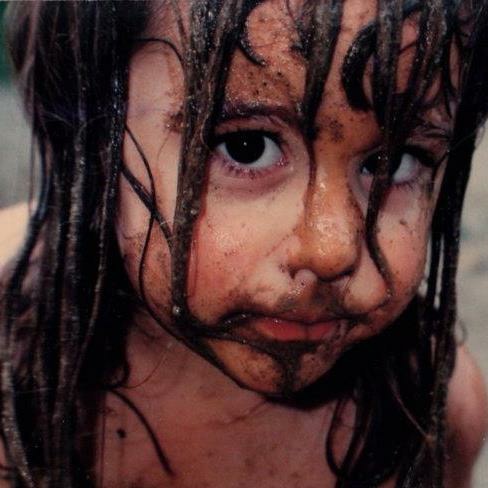
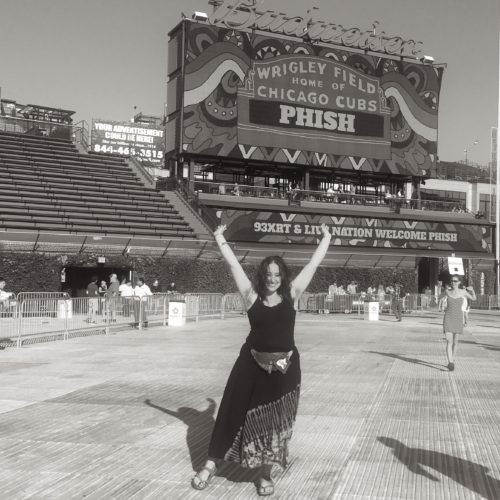
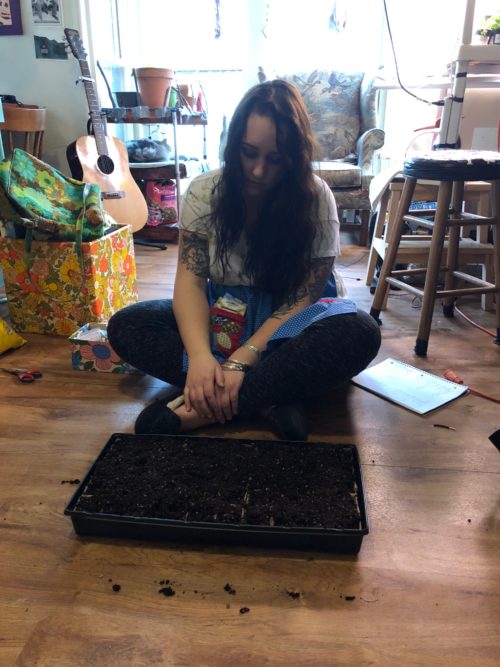
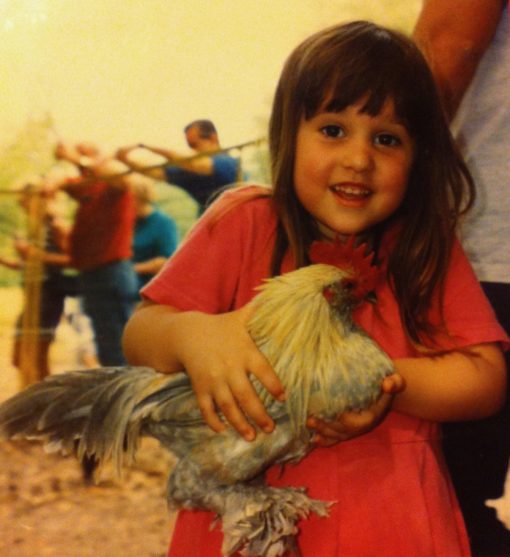







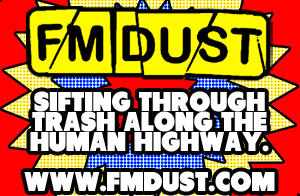



4 Comments
Safe travels, Merritt. I hope things work out the way you want them to in Tecumseh.
Tecumseh is more about “Sidewalk Sales” than porching, but hopefully you’ll find happiness there.
Have you already begun pronouncing Tecumseh in the proper way? It’s good to be saying it right before moving there. Some people are real touchy about it.
I try to pronounce it in a different way every time I say it, never repeating a pronunciation. I do this to annoy and offend people.
Is there a shop where people moving out of Ypsilanti can have all their piercings and tattoos removed?